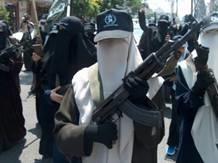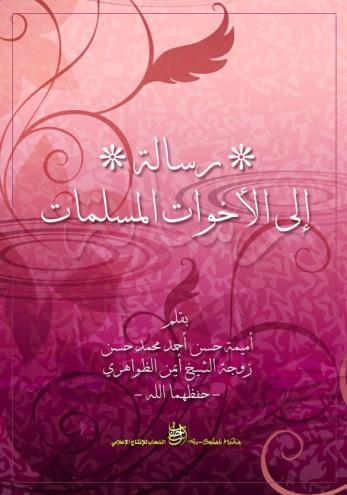With the recent news of the arrest of American jihadist Colleen LaRose (Jihad Jane) and the suicide attacks on Moscow’s subway system by “Black Widows,” women seem to have become a prime threat emanating from the jihadist movement.
However, despite these high profile incidents, the leaders of the jihadist movement are not actively encouraging women to participate in jihad physically. Rather, al-Qaeda and related groups instead advocate that women play more of a supporting role for the mujahideen, providing them succor, offering aid, soliciting donations, distributing propaganda, and raising the next generation of mujahideen.
Women play a very active role on jihadist forums and some have expressed frustration with their inability to participate in jihad physically. However, al-Qaeda’s leaders have been unequivocally clear that women should not engage in operations or attempt to join jihadist groups on the ground. When Ayman al-Zawahiri gave an open interview to jihadist forum members in early 2008, one woman asked Zawahiri, “Does al-Qaeda accept women in its ranks?” to which Zawahiri bluntly replied, “No.”
Another asked, “Who is the highest ranking woman in al-Qaeda? Don’t mention names if you do not want to do so, but what is their duty in the organization?” Zawahiri responded that al-Qaeda had no women in its ranks and that the role of women is to take care of the families of the mujahideen:
| “Al-Qaeda has no women, but the women of the mujahideen do their heroic part in taking care of their homes and sons in the roughness of the immigration, movement, unity, and expecting the Crusader strikes. But the Crusaders - who claim defense of liberty and human rights - purposefully strike woman, children, and civilians in their wars in Iraq, Afghanistan, Chechnya, and Palestine, so as to force the fighters to either retreat or surrender. This is their constant method in their wars. Then after they destroy villages and the homes, the blame falls on the Mujahideen because they were the ones who took cover in the families. These crimes will not - Allah willing – go without punishment.” |
In December 2009, Zawahiri’s wife, Umayma Hassan Ahmed Muhammad Hassan, reiterated her husband’s advice to women in a special a written statement titled, “A Message to the Muslim Sisters.” In the message, Hassan acknowledges that women do desire to fight in the battlefield alongside men, noting that “There are many women who did martyrdom-seeking acts in Palestine, Iraq and Chechnya, and hurt the enemy and defeated them.” However, while supporting those women who have waged physical jihad, she argues it is extremely difficult for most women to travel to a land of jihad, as “it requires a Mahram [a male Muslim relative who can escort the woman], because the woman must have a Mahram in her comings and goings.”
Instead, Hassan advises most women, who are unable to participate physically in jihad, to play a supporting role, raising money, offering the mujahideen services, educating children to become jihadists, and proselytizing locally and through the internet. Hassan writes:
| “The Muslim woman must work beside the man to defend her religion and land, so she must defend with herself. If she is not able then with her money. If she is not able that, then by calling in the name of her religion through the calling upon her Muslim sisters in the mosques, schools, institutions and homes. If she is not able that, then through the internet, in which she writes her call, sends it, and spreads the call of the mujahideen. It will arrive, Allah willing, and it will find open ears and hearts. So I beg of you O Muslim sister, do not tire or get bored from supporting our religion in any way you can.” | ||
Mirroring her husband, Hassan further tells women that before all other activities to support the jihad, their “main role” is to care for the families of the mujahideen, especially after the men have been killed or imprisoned, and ensure that the next generation is taught the proper morals and religion in order to become strong mujahideen. Hassan writes:
| “But our main role - that we ask Allah to accept from us - is to preserve the mujahideen in their sons, houses and secrets, and to help them in raising their sons well. Your emigrant sisters – praise be to Allah - are fulfilling a great role in this field; they are patient, steadfast and courageous, and do not care for the world but desire the hereafter. All this despite their hardships, the loss of their husbands, sons and fathers, and the lack of stability. Indeed, some of them have even been imprisoned, but your emigrant sisters are patient.” |
 Other al-Qaeda branches have similarly maintained that the most effective role for women is to provide shelter and support to the mujahideen while raising jihadist children. In October 2009, al-Qaeda in the Arabian Peninsula (AQAP)’s “Echo of the Epics” online magazine carried an article titled, “The Women of Yemen and the Crusader War.” The article lauded several Yemeni women who had helped the mujahideen not by carrying out attacks but by offering aid and support.
Other al-Qaeda branches have similarly maintained that the most effective role for women is to provide shelter and support to the mujahideen while raising jihadist children. In October 2009, al-Qaeda in the Arabian Peninsula (AQAP)’s “Echo of the Epics” online magazine carried an article titled, “The Women of Yemen and the Crusader War.” The article lauded several Yemeni women who had helped the mujahideen not by carrying out attacks but by offering aid and support.
The magazine described how “a woman who is nearly sixty [and] is only afraid of Allah” provided sanctuary and protection to leaders of AQAP, including the group’s emir, Abu Baseer al-Wuhayshi who were on the run from the Yemeni government “on the first day of their escape from the political prison.” This women “sheltered them in her house which lies in the middle of Sanaa, and among the soldiers of Ali Abdullah Saleh, and in the shadow of a large security alert by all the military institutions, and during a state of alert that monitors inside and outside.”
AQAP described another woman who offered her house to hide those immigrating to Yemen to engage in jihad. The group noted her bravery and piety, stating that “she does not rest until she checks on them, and she [does not celebrate any holiday] unless she gives them a (lamb) as a gift.”
The group further championed another “old woman” named Um Hamad who “in the extreme heat and in the extremely dangerous security conditions” transports “food and water on foot to the [area where the immigrants are present], and she gives them the most recent news.” The magazine also noted that she was blessed to have her son killed in support of the jihad, reporting that “the news of the killing of her son in the name of Allah is one of the most beautiful pieces of news she gave.”
The article offered several more examples of women who were actively supporting the mujahideen in Yemen. These women, though, were not engaged in physical jihad, but buwere rather following the advice given by Zawahiri and other leaders of the jihadist movement. The women lionized in the magazine were offering aid and supplies, providing shelter, and giving their own sons to the jihad.
Although al-Qaeda’s leadership has refrained from exhorting women to participate in jihad physically, other jihadist ideologues have supported the notion that women can engage in battle, although this seems to be more the exception than the rule. Al-Samoud Media Brigade, a virtual jihadist group, issued a new magazine in February 2010 dedicated to women titled, “The Granddaughters of Khansa,” referring to a woman from the time of the Prophet Muhammad whose sons were killed waging jihad and is a female hero for jihadists.
The magazine contained an interview with an anonymous woman stated to be involved in jihad on the battlefield. When asked whether women should join the ranks of the mujahideen, the woman argues that women should if they are able but at the same time recognizes that for most women, engaging in jihad simply is not practical. Still, she argues, women who are capable should not neglect jihad:
| “The faithful woman is able, with help from Allah, to do jihad and raise the banner of Islam on high. We should not ignore the truth of the religious commitments that face the woman in her daily life, like children and the house and the marital requirements, but these matters should not be an obstacle to the jihadi woman who has proven her worth in the battlefields since the days of the Islamic conquests.” |
 Another article in the same magazine gave several examples of women from the early history of Islam who also participated in battle. However, the article argues that women may only engage in battle in certain circumstances, the first being if “the enemy raids Muslim territories and attacks them in the heart of their home. In this case, it is the duty of every person able to carry weapons, minor or adult, man or woman, to do so and to defend Muslims and to fight their enemy.” The second case is if “Muslims invade their enemy. In this case, women are allowed to march out with a big army where there is no worry that the enemy may defeat them and curse the women with them.”
Another article in the same magazine gave several examples of women from the early history of Islam who also participated in battle. However, the article argues that women may only engage in battle in certain circumstances, the first being if “the enemy raids Muslim territories and attacks them in the heart of their home. In this case, it is the duty of every person able to carry weapons, minor or adult, man or woman, to do so and to defend Muslims and to fight their enemy.” The second case is if “Muslims invade their enemy. In this case, women are allowed to march out with a big army where there is no worry that the enemy may defeat them and curse the women with them.”
To this end, the magazine describes a Chechen woman, Hawaa Barayev, who took part in a suicide operation after “the enemy invaded her land and humiliated her people.” The magazine explained, “Once her meeting-time with Allah got near, she performed the obligatory prayer, read the Qur’an, bid her parents and her relatives welfare in a scene that makes men’s determination too weak. After that, she got in her truck, entered an enemy center, and turned it into ruin. She then met her Lord as a martyr, as we consider her and we reckon none unto Allah.”
Thus, while certainly women who participate physically in jihad are lauded by fellow jihadists, the obligation of women in jihad is not as clear as it is for men, who are actively encouraged to embark on violent jihad. Although al-Qaeda in Iraq and other jihadist groups have utilized women in their operations, the official directive coming from al-Qaeda seems to be that women should maintain a supporting role in the jihad rather than participating themselves.
Still, as seen in the the magazine “The Granddaughters of Khansaa,” women are encouraged to participate in battle under certain conditions but must not neglect their foremost duties of taking care of their families, raising their children, and supporting their husbands waging jihad. We should expect that women will continue engaging in violent jihad; nonetheless, given the advice the leaders of al-Qaeda are giving women, it is unlikely that we will begin seeing vast amounts of women joining men on the fields of jihad in Afghanistan or Yemen.

